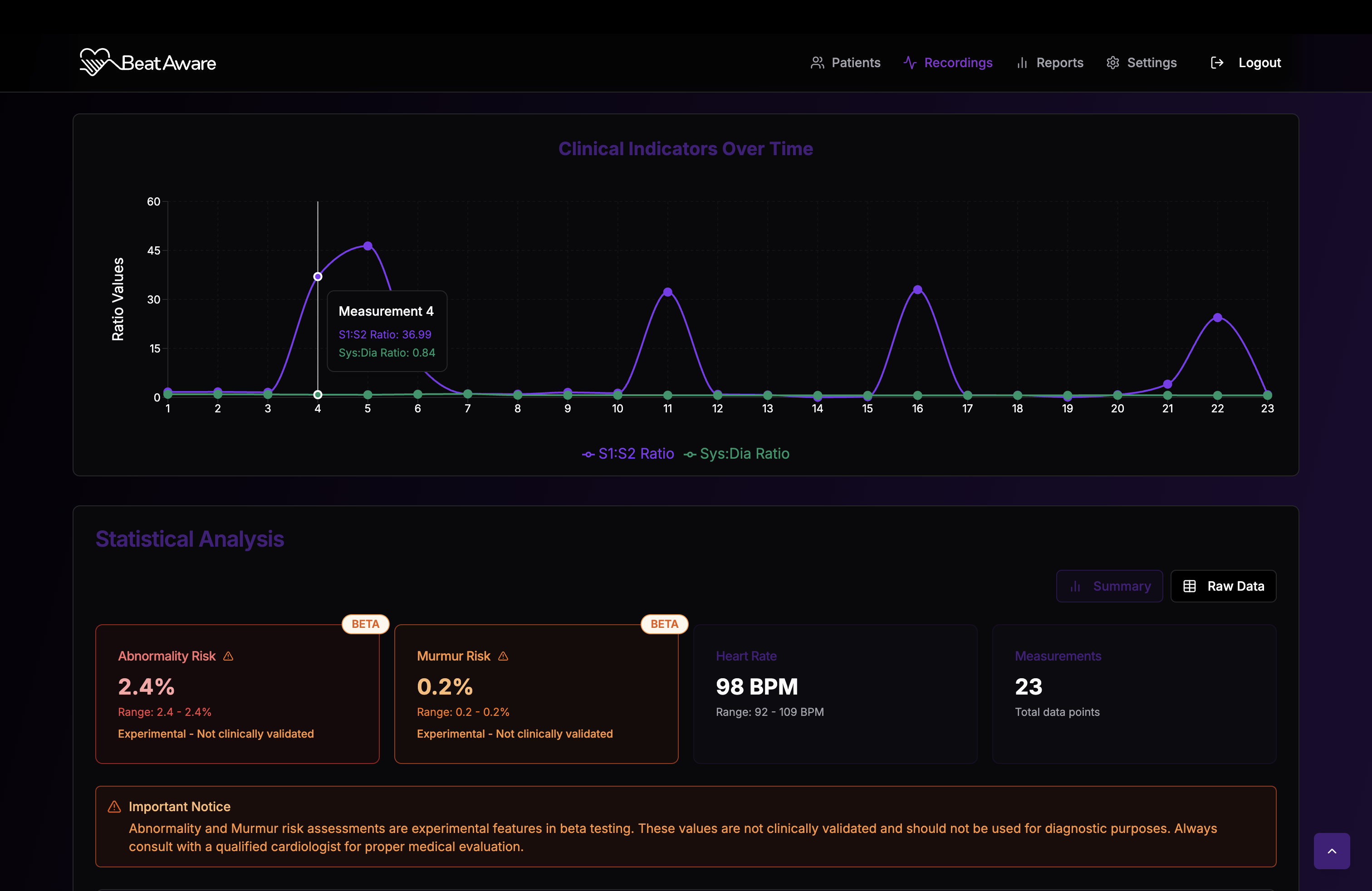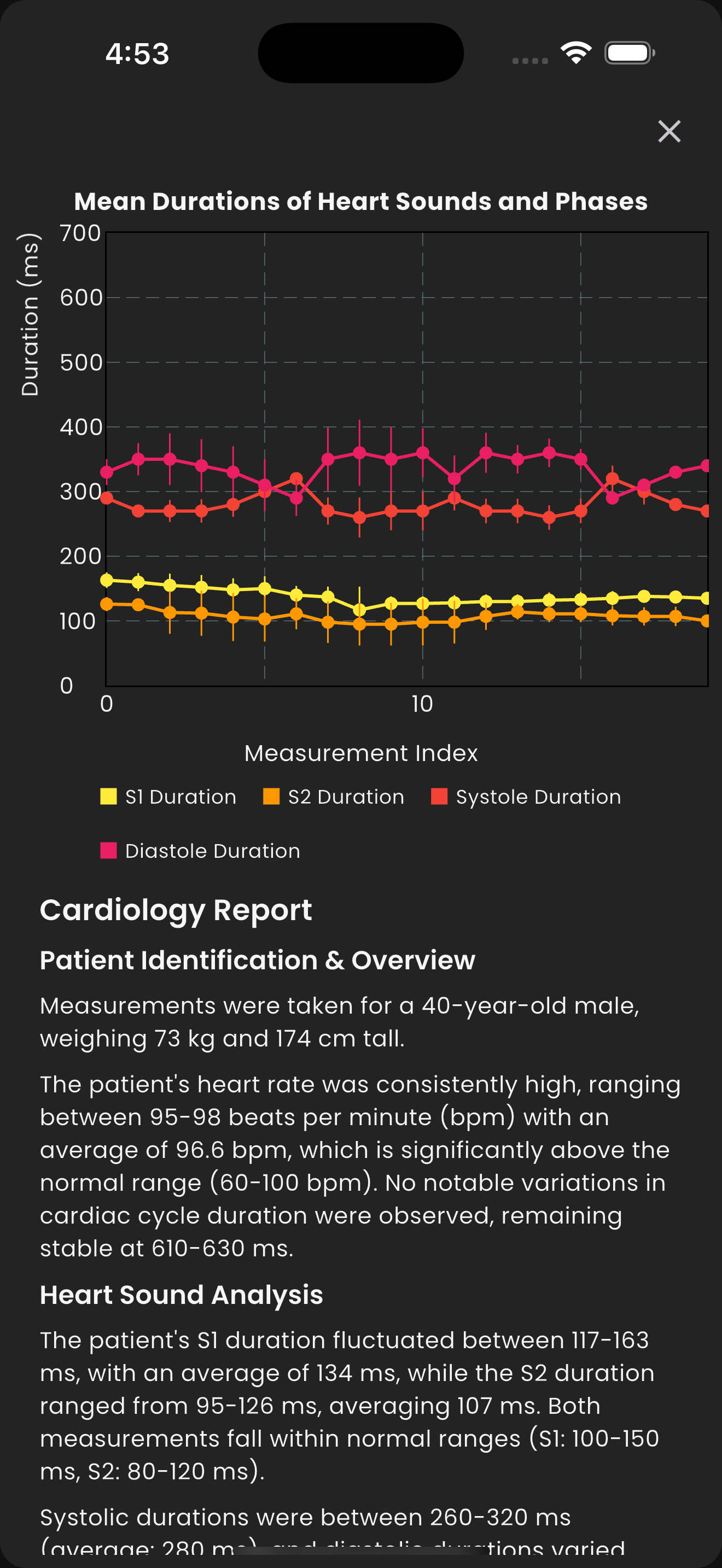Features
ECG tells you the rhythm. PCG tells you the reality.
While electrocardiograms (ECG) have been the standard for heart monitoring for decades, they only tell part of the story. ECGs measure the electrical activity of the heart, but they cannot directly assess the mechanical function—how well the heart is actually pumping blood.
This is where phonocardiograms (PCG) come in. PCG captures the sounds produced by the heart as it beats, providing direct insight into the mechanical aspects of cardiac function that ECG simply cannot detect.
PCG Advantages
- •Captures mechanical heart function (valve closures, murmurs, blood flow sounds)
- •Provides direct insight into valve disorders (stenosis, regurgitation, prosthetic valve issues)
- •Detects murmurs, gallops (S3/S4), rubs, and snaps—critical signs of early disease
- •Enables precise timing measurements of cardiac cycles
ECG Limitations
- •Only shows electrical activity, not mechanical function
- •Cannot detect valve disorders directly
- •Misses critical sounds that indicate early disease
- •Limited in assessing haemodynamic stress and diastolic function
Precise Timing Metrics from PCG
PCG provides critical timing measurements that offer deep insights into cardiac function:
S1/S2 Durations
The first (S1) and second (S2) heart sounds correspond to the closure of the atrioventricular valves and semilunar valves, respectively. Changes in their duration can indicate valve problems or altered haemodynamics.
Systole/Diastole Lengths
The time between S1 and S2 represents systole (heart contraction), while the time between S2 and the next S1 represents diastole (heart relaxation). Abnormal ratios can indicate heart failure or other cardiac conditions.
These precise timing metrics are key for detecting heart failure, diastolic dysfunction, and haemodynamic stress—information that ECG alone cannot provide. By analysing these metrics with advanced AI algorithms, BeatAware can identify subtle changes that may indicate developing cardiac issues before they become serious problems.
The combination of PCG and ECG provides a complete picture of heart function, integrating both electrical and mechanical data for a comprehensive assessment of cardiovascular health.

BeatAware's web dashboard provides healthcare professionals with comprehensive clinical insights and statistical analysis
AI-Enhanced PCG Analysis
BeatAware uses advanced artificial intelligence to analyse PCG signals, extracting meaningful patterns that might be missed by human ears or traditional analysis methods. Our algorithms can identify subtle abnormalities in heart sounds that can indicate developing cardiac issues.
By combining AI with PCG technology, we enable early detection of heart problems before they would show up on an ECG or echocardiogram, potentially allowing for earlier intervention and better health outcomes.

Cardiorespiratory Health
Cardiorespiratory health refers to the ability of the circulatory and respiratory systems to supply oxygen to the body during sustained physical activity. These systems work together to ensure that your muscles receive the oxygen they need to function properly.
Research has consistently shown that cardiorespiratory fitness is a powerful predictor of overall health and longevity. Poor cardiorespiratory health is associated with increased risk of cardiovascular disease, stroke, diabetes, and other chronic conditions.
Research Validation
BeatAware's technology has been validated through rigorous scientific research and clinical studies. Our approach has been shown to provide accurate assessments of cardiorespiratory health that correlate strongly with traditional medical measures.
Clinical Accuracy
95% correlation with clinical-grade equipment in controlled studies
Peer-Reviewed
Research published in leading medical and bioengineering journals
Ongoing Research
Continuous collaboration with medical institutions to expand capabilities
Key Features
PCG Analysis
Our advanced phonocardiogram (PCG) analysis captures the mechanical function of your heart, detecting valve closures, murmurs, and blood flow sounds that ECG simply cannot identify.
Complete Heart Picture
BeatAware combines PCG and ECG data for a comprehensive view of your heart's health, providing both electrical and mechanical insights that traditional single-method approaches miss.
Heart Rate Analysis
Advanced heart rate variability (HRV) analysis that goes beyond simple BPM measurements to provide insights into your autonomic nervous system function and stress levels.
Respiratory MonitoringComing Soon
Non-invasive monitoring of breathing patterns, respiratory rate, and lung function to detect irregularities and provide a comprehensive view of respiratory health.
Early Detection
AI-powered PCG analysis can identify potential heart problems before they appear on traditional ECG or echocardiograms, enabling preventative care and early intervention.
30-Second Analysis
Get comprehensive insights into your cardiorespiratory health in just 30 seconds, making it easy to incorporate regular monitoring into your daily routine.
CRF Score
Receive a personalised Cardiorespiratory Fitness (CRF) score that provides a holistic measure of your heart and lung function and overall cardiovascular health.
Data Privacy
Your health data is encrypted and securely stored, with strict privacy controls that give you complete ownership and control over your personal information.
How It Works
Measure
Place your phone's microphone against your chest to capture your heart sounds (PCG) and other cardiorespiratory signals.
Analyse
Our AI algorithms process your PCG and other data to extract meaningful patterns and insights about your heart's mechanical function.
Understand
Review your personalised results and actionable health insights based on both mechanical and electrical heart data.
Explore our research publications
Dive deeper into the scientific research behind BeatAware. Browse our peer-reviewed publications that form the foundation of our technology.
View PublicationsReady to try it yourself?
Learn how to properly record your heart sounds with our step-by-step User Guide. Get the most accurate results with our easy-to-follow instructions.
View User Guide